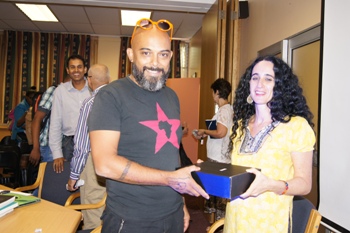The second Urban Futures Centre (UFS) seminar took place at at the University’s ESBE Boardroom, L3, S4, S Block, this week (27 March 2014).
Mauritian-born Doung Janhangeer; architect and founder of ArtArchitecture for social change (DALA), who is inspired by ‘imagining cities in new and different ways’, gave an awe-inspiring presentation about Durban being the ‘in-between city’ and spoke about the social, economic, spatial, philosophical and poetic territories in a post-apartheid South Africa. His interest is in what he calls ‘architecture without walls’.
DUT students, lecturers, academics from UKZN and other stakeholders who had attended the well-received presentation, were fascinated by his organisations’ work and his vision for Durban through his eyes as an architect.
Doung gave an insightful talk on his strategies of his organisation over the past decade which has learnt that there is a need to recognise and accentuate the knowledge embedded in the urban code in Durban and the country as a whole. His work has since been presented in 13 countries worldwide. Doung added that DALA began exploring new and innovative ways of observing and participating within the changing post apartheid city.
“The City Walk initiative, which started in February 2000, became a way of directly engaging and observing the flux and mutability in Durban. In 2008, I co-founded DALA, a non profit, inter-disciplinary organistion focusing on initiatives which engage art/architecture for social justice. Dala looks at cities where there are interesting things, people, environments (both living and non-living) and explore ways to find the beauty in living and non-living things in the city,” he said.
Doung also touched on the transformative role of creativity in building safer and more liveable cities which had emerged as a response to the growing need for a sustainable space for creative practitioners actively engaging in the production of art/architecture for social change in eThekwini.
“We recognise the need to engage in collective creative processes, which bear the potential to redefine and expand the concept of public space to new categories. DALA believes that sustainable change can only happen through democratic participation and collaboration. We therefore facilitate creative initiatives between creative practitioners from a variety of backgrounds,” he added.
He also spoke about Durban being a place of radical openness and an incubation of creativity.
“Overwhelming on the surface we found that there is this notion of Durban being an ‘in-between city’ between Cape Town and Johannesburg. We have found that how we live our lives and how the city of Durban is, is groundbreaking in terms of getting solutions through the African city,” he said.
He added that the momentum is to transform top down policies through extensive urban experiments, nationally and internationally and poetical issues in a post-apartheid South Africa.
The weekly seminars will resume from 17 April 2014. Kira Erwin will be presenting a seminar entitled: Shifting identities and governance in low cost housing estates.
The UFC urges all DUT staff and students to attend these seminars. Any graduate students and staff conducting research on urban spaces should consider presenting as part of this seminar series. The seminars are open to the public and the UFC@DUT welcomes participation from government officials, researchers, civil society actors and individuals interested in the future of cities. Contact Professor Monique Marks at moniquem@dut.ac.za
– Waheeda Peters
Pictured: Prof Monique Marks, along with Architect Doung Janhangeer, at the seminar.


